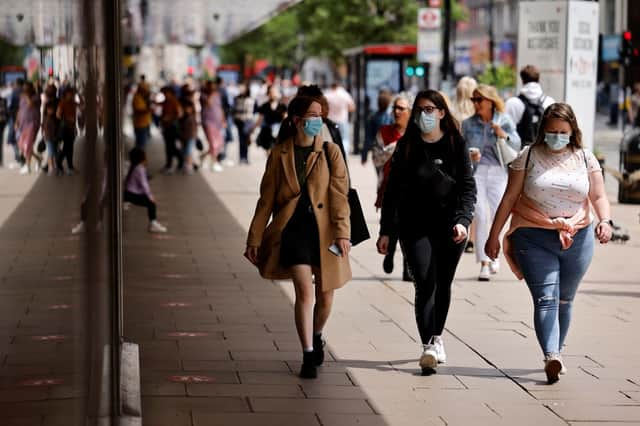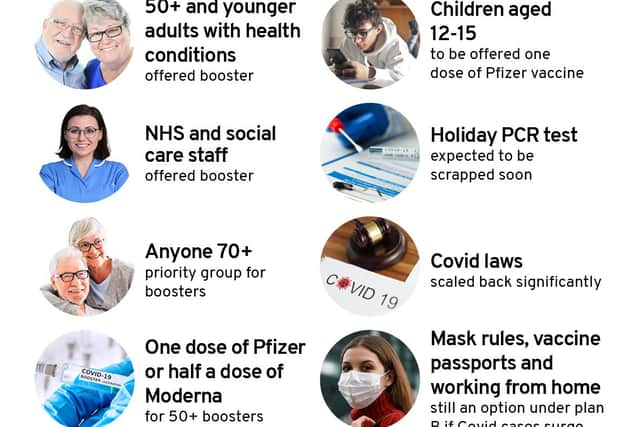The factors that could trigger winter ‘Plan B’ of face masks and Covid passports


Mandatory face masks, Covid passports and working from home could be introduced in England this winter if Covid-19 cases surge.
Health Secretary Sajid Javid warned the measures are part of a “Plan B” if efforts to control the spread of coronavirus are not effective during the colder months.
Advertisement
Hide AdAdvertisement
Hide AdWhat did Sajid Javid say?
Mr Javid said the contingency plans will only be put in place if there is “unsustainable” pressure on the NHS.
The current “Plan A” for autumn and winter relies on a booster vaccination campaign to keep cases under control, with millions of eligible people to start receiving the third doses from next week.
The booster jabs will be offered to all over 50s, along with those in care homes and frontline health and social care workers.
People are encouraged to meet outdoors where possible, wear face coverings in crowded and enclosed settings, wash their hands frequently and use the NHS Covid-19 app.
Advertisement
Hide AdAdvertisement
Hide AdBusinesses have also been urged to consider using the Covid pass to check the vaccination or test status of customers.
Mr Javid told MPs: “The plan shows how we’ll give this nation the best possible chance of living with Covid without the need for stringent social and economic restrictions.”
But he added: “We have seen how quickly this virus can adapt and change so we have prepared a Plan B of contingency measures that we can call upon only if they are needed and supported by the data to prevent unsustainable pressure on the NHS.”
Those measures could include:
– Communicating clearly and urgently to the public that the level of risk has increased, and with it the need to behave more cautiously.
Advertisement
Hide AdAdvertisement
Hide Ad– Introducing mandatory vaccine-only Covid-pass use in settings including nightclubs; indoor venues with 500 or more attendees likely to be in close proximity to others, such as music concerts; outdoor settings with 4,000 or more people, such as festivals; and any settings with 10,000 or more people, such as sports events.
– A legal requirement to wear face coverings in some settings.
– Advice to work from home.
The plan to introduce mandatory Covid passports by the end of September was scrapped by ministers last week, but it is possible the measure may be introduced if cases rise significantly.


What could trigger ‘Plan B’?
Mr Javid said that significant pressures on A&E and increasing hospital admissions are the factors that could trigger the government’s ‘Plan B’ for tackling Covid-19 this winter.
Advertisement
Hide AdAdvertisement
Hide AdThe Health Secretary denied that the UK was in the same position as this time last year and defended not bringing in more stringent measures now as the vaccination and booster programme will provide a “strong line of defence”.
He also added that a new coronavirus variant would not be the trigger for a move to Plan B.
Speaking to Sky News, he said: “A dangerous new variant would be, of course, of huge significant concern, but there could be other issues.
“So for example, what happens in the NHS is going to be hugely important to me, to the whole country, making sure that we don’t get to a position again where the NHS becomes unsustainable.
Advertisement
Hide AdAdvertisement
Hide Ad“I think we’re going to have to look at a number of measures… so of course that would be the level of hospitalisation, it will be the pressures on A&E, the pressures on the workforce, so we’d have to take all of these together…”
Mr Javid declined to give a number on how many cases or admissions would trigger Plan B, but the autumn and winter plan states that the contingency measures “should be sufficient to reverse a resurgence”, although “the nature of the virus means it is not possible to give guarantees”.
It adds that “more harmful economic and social restrictions would only be considered as a last resort”.
However, fresh legislation would be required if further lockdowns are needed.
This article originally appeared on our sister site, NationalWorld.